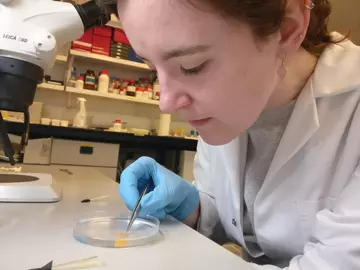
Avian conservation
Hatching failure
Globally, around 13% of all bird species are threatened with extinction, and 40% have declining populations.
Conservation programmes apply interventions both in the wild and in ex situ facilities such as zoos to try and prevent extinction and preserve species, but a common challenge facing many bird populations is high levels of hatching failure.
On average, around 10% of eggs fail to hatch, but this rate can be much higher in populations of threatened species and populations undergoing management. Until recently, the vast majority of eggs which failed to hatch without obvious signs of embryo development were classified as ‘infertile’, however, recent work has shown that often these eggs are actually fertilised but fail to hatch due to embryo death at a very early developmental stage. High levels of hatching failure can limit the success of conservation programmes, for example reducing the number of chicks produced within a captive-breeding programme.
In my PhD I aim to investigate the key factors underlying hatching failure in birds, focusing on environmental, behavioural and disease-related drivers.
I am fortunate to be able to work with ZSL’s captive-breeding populations held in London Zoo and with New Zealand conservation programmes for the hihi (Stitchbird; Notiomystis cincta) and kakī (Black Stilt; Himantopus novaezelandiae), to identify patterns of infertility and early embryo mortality within and between species using fluorescence microscopy methods. I am also conducting a large, comprehensive systematic review of avian hatching failure from published literature to establish overall baselines for hatching failure across species, and conducting in-depth investigations into the eggshell microbiome, hatching failure, and ecological and environmental factors.

The ultimate goal of my project is to identify how and why various factors have consequences for hatching success in different managed populations, and to work with conservation practitioners to use this understanding to support decision-making to try and optimise the hatching success of managed populations, ultimately helping to bring species back from the brink of extinction."
My vision for the future in my area of work would be a strong focus on evidence-based conservation, and more collaboration between researchers and conservation practitioners, in particular sharing knowledge and exchanging ideas.
For this project in particular I would like to see more investigation into the causes behind hatching failure in managed populations which can then be used to guide the interventions applied to best mitigate any problems.

As a scientist I am interested in behaviour, ecology, and conservation, and the overlaps between them.
In particular, I am interested in how animal behaviour can be affected by environmental and anthropogenic factors, and how this can have both positive and negative impacts on their survival. I am also passionate about communicating science to diverse audiences and helping to show that science and conservation are for everyone, and I enjoy participating in opportunities for public outreach as part of the ZSL community and beyond.
Marshall, A. F., Balloux, F., Hemmings, N.*, Brekke, P.* (2023) Systematic review of avian hatching failure and implications for conservation. Biological Reviews. 98(3): 807-832. doi:10.1111/brv.12931. *Joint senior authorship
Assersohn, K.*, Marshall, A. F.*, Morland, F.*, Brekke, P.†, Hemmings, N. † (2021) Why do eggs fail? Causes of hatching failure in threatened populations and consequences for conservation. Animal Conservation. 24(4): 540–551. doi:10.1111/acv.12674. *Joint lead authorship; †Joint senior authorship
Marshall, A. F., Bardua, C., Gower, D. J., Wilkinson, M. W., Sherratt, E., Goswami, A. (2019) High-density three-dimensional morphometric analyses support conserved static (intraspecific) modularity in caecilian (Amphibia: Gymnophiona) crania. Biological Journal of the Linnean Society. 126(4):712–742. doi:10.1093/biolinnean/blz001.
Marshall, A., Schulte to Bühne, H., Bland, L., Pettorelli, N. (2018). Assessing ecosystem collapse risk in ecosystems dominated by foundation species: The case of fringe mangroves. Ecological Indicators. 91:128-137. doi:10.1016/j.ecolind.2018.03.076.
